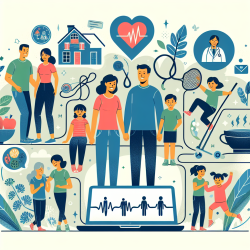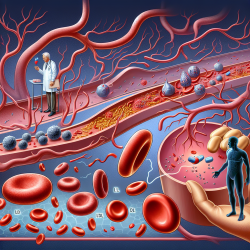Introduction
In the ever-evolving landscape of health interventions, the importance of community engagement cannot be overstated. The recent research article, "Relational Community Engagement within Health Interventions at Varied Outcome Scales," sheds light on the transformative power of relational community engagement across micro, meso, and macro levels. For practitioners, understanding and implementing these insights can significantly enhance the effectiveness of health interventions, particularly in the context of online therapy services like those provided by TinyEYE.
The Power of Relational Community Engagement
Relational community engagement is a holistic approach that emphasizes building and maintaining trust-based relationships among stakeholders to address health-related issues. This approach is not merely transactional but focuses on nurturing long-term connections that foster collaboration and co-production for improved health outcomes.
The research highlights several positive outcomes of relational community engagement:
- Micro Level: At the individual level, relational community engagement leads to increased empowerment, improved knowledge, and positive behavioral changes.
- Meso Level: At the community level, it fosters trust, enhances community ownership, and strengthens relationships among stakeholders.
- Macro Level: At the societal level, it influences health policies, promotes collaboration across sectors, and improves access to services.
Implementing Relational Community Engagement in Practice
For practitioners, integrating relational community engagement into health interventions can be a game-changer. Here are some practical steps to consider:
- Build Trust: Establish and maintain trust-based relationships with community members and stakeholders. This involves active listening, transparency, and consistent communication.
- Foster Collaboration: Encourage collaboration among various stakeholders, including community members, organizations, and institutions. This can lead to co-designed interventions that are more effective and sustainable.
- Empower Communities: Empower community members by involving them in decision-making processes. This fosters a sense of ownership and accountability, leading to more successful health outcomes.
- Leverage Technology: Utilize online platforms and digital tools to facilitate communication and collaboration, especially in the context of online therapy services.
Encouraging Further Research
While the current research provides valuable insights, there is still much to explore in the realm of relational community engagement. Practitioners are encouraged to engage in further research to deepen their understanding and enhance their practice. Areas for future research include:
- Exploring the impact of relational community engagement on different populations and settings.
- Investigating the long-term effects of relational community engagement on health outcomes.
- Developing metrics and tools to measure the effectiveness of relational community engagement interventions.
Conclusion
Relational community engagement holds immense potential for transforming health interventions and improving outcomes at all levels. By embracing this approach, practitioners can create more meaningful and sustainable health solutions that truly empower communities. As we continue to navigate the complexities of health interventions, let us remain committed to fostering relationships and collaboration for a healthier future.
To read the original research paper, please follow this link: Relational community engagement within health interventions at varied outcome scales.










